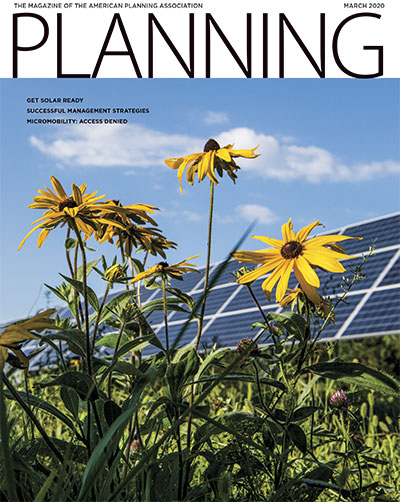Planning March 2020
Planning March 2020

Micromobility's Impact on Transit
Micromobility promises an environmentally friendly way of solving first/last mile needs, while getting more people onto transit. Planning's March cover story asks, can ride share, scooters, and accessibility coexist? It's up to planners to ensure micromobility doesn’t leave anyone behind. Examine 13 strategies for effective management in a collaborative profession — no matter where you are in your career. Then, take seven steps to ensure your community is prepared to manage large-scale solar development.
Featured Articles
Access Denied
Micromobility has potential to be an urban asset, but it's up to planners to ensure people with disabilities are not left behind. Steve Wright reports. PLUS: Accessible ride share?
Are You Solar Ready?
Energy planner Megan Day outlines seven steps to help your community manage large-scale solar development. PLUS: Big benefits of large-scale solar and a case study by Brian Ross.
Taking the Lead
Whether you're a newbie or a veteran manager, we've got 13 strategies for all-around success on the job. Story by Linda McIntyre.
Intersections
The High Cost of Deferred Maintenance
America's wastewater systems are overworked and underfunded — and it's leaving cities across the country under water.
After 140 Years, the Wiyot Tribe Has Come Home
For the first time in U.S. history, a local municipality has returned stolen Native land without an accompanying sale or lawsuit.
It's Time to Go Dutch
Mike Sewell, PE: "As an engineer who creates multimodal facilities, I've heard almost all the arguments against bicycle and pedestrian-friendly projects. It's time we stop making excuses."
The Other Lead Crisis
HUD spends millions on lead abatement. So why are public housing authorities still struggling?
Charging Stations Still Too Few and Far Between
More electric cars are on the road, but most states lack the infrastructure to keep them going.
Tools for the Trade
Planning's Emotional Paradox
Emotions motivate public servants — but planners' education, training, and professional norms lead us to try to ignore or avoid our own feelings.
Cover: Dennis Schroeder, NREL/DOE.


